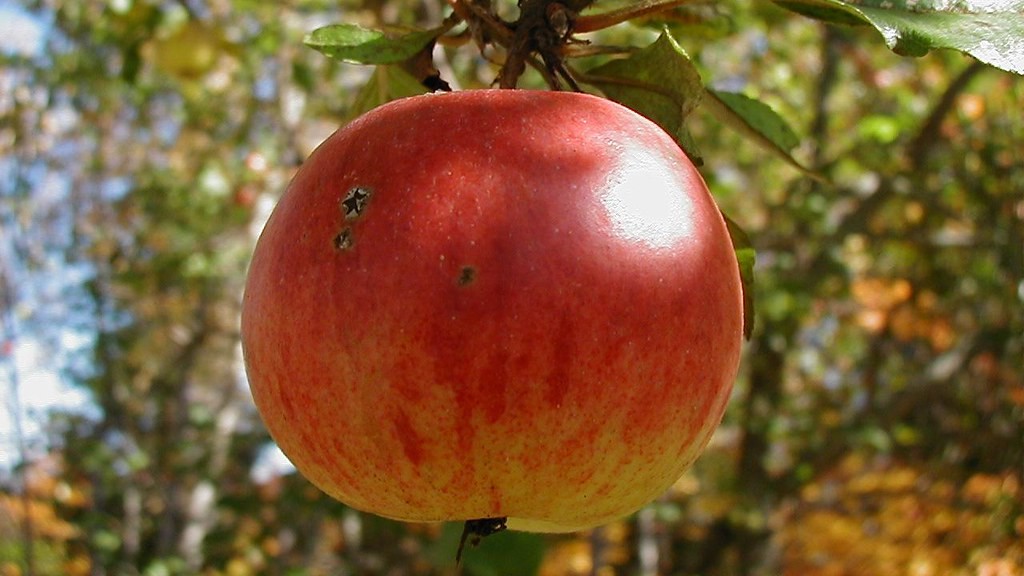Whether or not you should be eating the cherries from your cherry tree can be a tricky question for some. It is important to understand the difference between sweet cherries and sour cherries in addition to the nutritional benefits cherries can offer.
Sweet cherries are the more familiar variety, commonly used for pies, jams, juices and dried fruit. The trees grow well in temperate climates, from northern Europe to California and Canada. The trees are often small and can be vulnerable to pests and disease. The fruit is juicy and sweet, so it can be eaten raw, cooked in desserts, or made into juice and consumed as a beverage.
Sour cherries, on the other hand, are often used for jams, cereals and other recipes that require a tart flavor. The trees typically require a warm climate, with adequate rainfall to produce a full crop. The fruit is usually smaller and more acidic than sweet cherries, so it is usually processed before eating. Unlike sweet cherries, sour cherries contain more fibers, vitamins, and minerals. As such, they can provide some health benefits.
Nutritionally speaking, cherries are a nutritious food. Sweet cherries are low in calories, fat and sugar but are a good source of fiber. They’re also packed with antioxidants, which can help reduce inflammation, fight cancer and improve heart health. Sour cherries, on the other hand, are higher in fiber, vitamin A and potassium, making them a more healthful option.
When it comes to safety, it’s important to remember that not all cherries are edible, so you should always be careful when deciding to eat them. Wild cherries can contain substances that can be toxic. It’s a good idea to check with your local extension office to make sure the cherries on your tree are safe to consume.
The bottom line is that if you have a cherry tree that produces edible, edible fruit, then it is safe to eat the cherries. You should read up on the variety and check to make sure that it is safe. With that said, cherries can be a great source of nutrition in your diet, and they’re a great way to enjoy the natural sweetness of the season.
Nutrient Benefits of Cherries
As mentioned, cherries are an excellent source of vitamins, minerals and antioxidants. In particular, cherries are a good source of vitamin C, potassium, manganese, and copper. They also contain a significant amount of dietary fibers and phytonutrients. The dietary fibers can help improve digestion and improve heart health. The phytonutrients, such as quercetin and ellagic acid, can help reduce inflammation and can provide protection against some types of cancer.
In terms of antioxidants, cherries have among the highest levels of plant-based antioxidants, such as anthocyanins, among all fruits. Studies have found that antioxidant-rich diets can help reduce inflammation and improve cardiovascular health. Furthermore, studies have also linked cherries to improved cognitive performance, better sleep and improved muscle recovery after exercise.
The nutrient benefits of cherries can be significant, especially when eaten in reasonable amounts. When consumed in moderation, the health benefits of cherries are likely to outweigh any potential risks. However, it is important to note that cherries, like other fruits and vegetables, can contain pesticides and other chemicals, so it may be best to purchase organic when possible.
How to Select Quality Cherries
When selecting cherries, it is important to choose ones that are firm, plump and even in color. The stems should be bright green and free of cracks. Cherries should also be free of blemishes or soft spots, as these are signs that the cherries are overripe. You should also look for a red blush on the shoulders of the cherry, which is a sign of freshness.
When picking cherries, try to be careful not to bruise them. This can affect their taste and texture. You should also check that the stem is attached, as this can affect their storage life. Lastly, it is important to remember that cherries can be sensitive to changes in temperature, so you should make sure to store them properly once you bring them home.
Storing and Preparing Cherries
To store your cherries, keep them in the refrigerator at a temperature of 36-40°F. They should be stored in a plastic bag and can last for about two weeks, although the fresher the cherries, the sweeter the taste. Fresh cherries can be washed in a colander and dried with a cloth or paper towel before eating.
As far as preparing your cherries, you can eat them fresh or use them in recipes such as pies and jams. One of the simplest ways to enjoy cherries is to make a smoothie or compote with the fresh fruit. You can also roast or bake cherry pieces with a small amount of sugar and cinnamon or add them to your favorite salad.
Risks Associated with Eating Cherries
Eating cherries can be beneficial to your health, but there are a few risks associated with eating too many. One of the most notable risks is that cherries can be a choking hazard for young children, so it is important to be careful when feeding cherries to small children. Furthermore, cherries contain oxalates, which can cause kidney stones. For this reason, it is important to limit the amount of cherries you eat if you have a history of kidney stones.
Additionally, cherries contain naturally occurring sugars and acids, which can be harsh on the digestive system when eaten in large quantities. If you experience any discomfort, you may want to reduce your consumption to a reasonable level.
Conclusion
In conclusion, if you have a cherry tree that produces edible cherries, then it is safe to eat the cherries. Eating cherries can be a great way to add some nutritious fruit to your diet. Cherries are packed with antioxidants, vitamins, and minerals, and they can even help improve cognitive performance and muscle recovery. When you select cherries, make sure to choose ones that are firm, plump and even in color. Be careful not to bruise or overripen them, and store them in the refrigerator at a temperature of 36-40 degrees. Lastly, be sure to limit your consumption to avoid any potential risks associated with excessive consumption of cherries.




